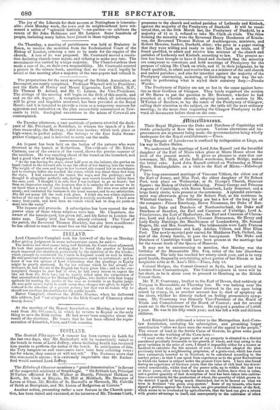IRELAND.
Lord Chancellor Campbell took his farewell of the bar on Monday. After giving judgment in some unimportant cases, he said— The motions and short causes being now finished, the Court stood adjourned. He took that opportunity of stating, that he found the practice in Ireland much improved and shortened, particularly by the abolition of the Six Clerks ; which example he considered the Courts in England would do well to follow. He still perceived matters in which improvements could be introduced ; and he knew it was the opinion of Lord Cottenharn that the pleadings in Equity might be greatly shortened. In the law reforms which he bad already in- troduced, he had the aid of the English bar freely given him ; and in the con- templated changes he now had in view, he had every reason to expect the like aid from the Irish bar; hut he mainly relied upon the cooperation of that accomplished lawyer Sir Michael O'Loghlen, who decided with that happy aptitude for meeting the justice of the case so desirable in an Equity judge. He was quite aware, before lie could carry these changes into effect, he might be reduced to the situation of a private person; but that was no reason why he should not continue his exertions for the public benefit. Baron Campbell, observes the Dublin Monitor, when he delivered this address, had "sat altogether in the Irish Court of Chancery about twenty hours."
At the meeting of the Repeal Association, on Monday, a letter was read from Mr. O'Connell, in which he reverts to Repeal as the only thing to save the Irish nation. He had never been sanguine about the result of the elections. He boasts that he has been offered the repre- sentation of Limerick, Clare, and Cork counties.


























 Previous page
Previous page